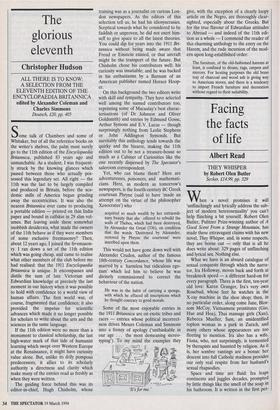The glorious eleventh
Christopher Hudson
ALL THERE IS TO KNOW: A SELECTION FROM THE ELEVENTH EDITION OF THE ENCYCLOPAEDIA BRITANNICA edited by Alexander Coleman and Charles Simmons Deutsch, f20, pp. 405 Some talk of Chambers and some of Whitaker, but of all the reference books on the writer's shelves, the palm must surely go to the 11th edition of the Encyclopaedia Britannica, published 83 years ago and unmatchable. As a student, I was frequent- ly struck by the knowing glances which passed between those who actually pos- sessed this legendary set. All right — the 11th was the last to be largely compiled and produced in Britain, before the aca- demic mills of America began grinding away the eccentricities. It was also the nearest Britannica ever came to producing a portable edition — printed on thin India paper and bound in calfskin in 29 slim vol- umes. But leaving aside these somewhat snobbish desiderata, what made the owners of the 11th behave as if they were members of some exclusive freemasonry? Then, about 12 years ago, I joined the freemason- ry. I ran down a set of the 11th edition which was going cheap, and came to realise what other members of the club before me had realised: that the 1911 Encyclopaedia Britannica is unique. It encompasses and distils the sum of late Victorian and Edwardian knowledge at precisely the last moment in our history when it was possible to hold with confidence to a world view of human affairs. The first world war, of course, fragmented that confidence; it also provided the impetus for scientific advances which made it no longer possible for scholars to write about the arts and the sciences in the same language.
If the 11th edition were no more than a monument to classical scholarship, the last high-water mark of that tide of humanist learning which swept over Western Europe at the Renaissance, it might have curiosity value alone. But, unlike its drily pompous predecessors, it allies to its scholarly authority a directness and clarity which make many of the entries read as freshly as when they were written.
The guiding force behind this was its editor-in-chief, Hugh Chisholm, whose training was as a journalist on various Lon- don newspapers. As the editors of this selection tell us, he had his idiosyncrasies. Sceptical towards what he considered to be faddish or unproven, he did not exert him- self to give space to all the latest theories. You could dip for years into the 1911 Bri- tannica without being made aware that Freud or Einstein existed, or that aircraft might be the transport of the future. But Chisholm chose his contributors well; his curiosity was insatiable; and he was backed in his enthusiasms by a Barnum of an American publisher named Horace Hoop- er.
On this background the two editors write with skill and sympathy. They have selected well among the named contributors too, reprinting some of Macaulay's best charac- terisations (of Dr Johnson and Oliver Goldsmith) and entries by Edmund Gosse, Arthur Symons and E.V. Lucas — though surprisingly nothing from Leslie Stephens or John Addington Symonds. But inevitably this anthology tends towards the quirky and the bizarre, making the 11th edition out to be not a treasure-house so much as a Cabinet of Curiosities like the one recently dispersed by The Spectator's saleroom correspondent.
Yet, who can blame them? Here are adventuresses, poisoners, and mathemati- cians. Here, as modern as tomorrow's newspapers, is the fourth-century BC Greek courtesan Phryne (said to have 'made an attempt on the virtue of the philosopher Xenocrates') who
acquired so much wealth by her extraordi- nary beauty that she offered to rebuild the walls of Thebes, which had been destroyed, by Alexander the Great (336), on condition that the words 'Destroyed by Alexander, restored by Phryne the courtesan' were inscribed upon them.
This would not have gone down well with Alexander Cruden, author of the famous 18th-century Concordance, 'whose life was marred by a harmless but ridiculous ego- tism' which led him to believe he was divinely commissioned to correct the behaviour of the nation.
He was in the habit of carrying a sponge, with which he effaced all inscriptions which he thought contrary to good morals.
Some of the most enjoyable entries in the 1911 Britannica are on exotic tribes and races — entries whose political incorrect- ness drives Messrs Coleman and Simmons into a frenzy of apology (`unthinkable in our age . . . the most demeaning stereo- typing'). To my mind the examples they It's for me.' give, with the exception of a clearly loopy article on the Negro, are thoroughly clear- sighted, especially about the Greeks. But for the true flavour of Edwardian attitudes to Abroad — and indeed of the 11th edi- tion as a whole — I commend the reader of this charming anthology to the entry on the Harem, and the rude incursion of the mod- ern upon long-established order: The furniture, of the old-fashioned harems at least, is confined to divans, rugs, carpets and mirrors. For heating purposes the old brass tray of charcoal and wood ash is giving way to American stoves, and there is a tendency to import French furniture and decoration without regard to their suitability.


























































 Previous page
Previous page